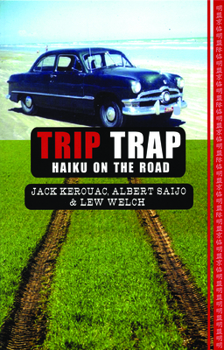Trip Trap
Select Format
Select Condition 
Book Overview
On a rainy night in San Francisco, just before Thanksgiving in 1959, Jack Keroauc, Lew Welch, and Albert Saijo piled into Welch's car and set off on a cross-country trip, headed for New York City and then on to Keroauc's mother's home on Long Island.
Trip Trap is a record of that journey, notes from the road by three of the central figures of the Beat Movement as they shared booze and coffee and peanut butter sandwiches, talking and singing and versifying while the country slipped by out the window. Here are the haiku that Keroauc, Saijo, and Welch jotted down in notebooks, along with a recollection of the trip written by Saijo in 1973, a section from Welch's unfinished novel that describes the trip and the return, and Welch's early 1960 letters to Keroauc that continue the bond forged during those days on the road together.
Jack Kerouac (1922-1969) was a principal actor in the Beat Generation, a companion of Allen Ginsberg and Neal Cassady in that great adventure. His books include On the Road, The Dharma Bums, Mexico City Blues, Lonesome Traveler, Visions of Cody, Pomes All Sizes (City Lights), Scattered Poems (City Lights), and Scripture of the Golden Eternity (City Lights).
Lew Welch (1926-1971?) was an American poet and active participant in the Beat generation literary movement. From 1965 to 1970, he taught a poetry workshop. His works, which were published by City Lights/Grey Fox, include Trip Trap: Haiku on the Road, Selected Poems, and Ring of Bone.
Albert Saijo (1929-2011) was a Japanese-American poet and active participant in the Beat Generation literary movement. He and his family were imprisoned, along with many other Japanese-American families, as part of the internment of Japanese Americans during World War II. During this time he wrote about his internment experience for his high school newspaper. After joining the US Army and studying at University of Southern California, he became friends with Jack Keroauc and other influential Beat Generation figures. His famous works include The Backpacker (1972) and Outspeaks: A Rhapsody (1997). A collection of his works from the 80s and 90s, Woodrat Flat, was published posthumously in 2014.






